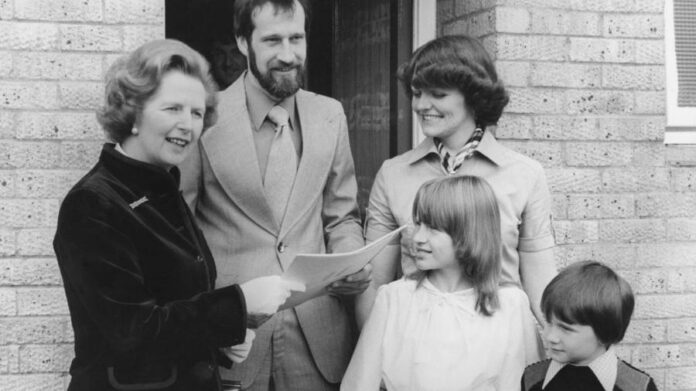Receive free UK business & economy updates
We’ll send you a myFT Daily Digest email rounding up the latest UK business & economy news every morning.
The writer is chair of Marks and Spencer
When Margaret Thatcher came to power, she recognised that, for free enterprise to succeed, ordinary people needed to feel they had a stake in society. A million council house tenants were enabled to buy their own homes and, when our nationalised industries were privatised, large allocations were made to retail investors so they could benefit. In the Thatcher-Major era, sizeable numbers of employees had share options in the companies they worked for as well. At Asda, during my time as chief executive, we launched what was then the largest employee share ownership scheme in the UK so that over 65,000 colleagues could feel they owned a little bit of the business.
Today, the public has lost that stake. People feel detached from the businesses that employ, profit, invest and pay tax in the UK. The percentage of equities owned by UK residents has fallen for three decades and now stands at a measly 12 per cent — compared to more than 50 per cent of us in the 1960s.
Even our pension schemes own fewer equities — and fewer UK equities to boot. The big defined benefit schemes have regulatory incentives to invest in bonds and minimise risk. Savers in the auto enrolment pension schemes receive minimalist communications; in truth most do not know what they are invested in. Changes in the accounting and tax rules mean that the big employee share option schemes have largely vanished.
Worse, those who do put their savings in the stock market are detached from their shareholdings because they are increasingly invested through convenient nominee platforms. More than 40 per cent of shareholdings are now held through nominee accounts — most companies do not know who shareholders are, do not communicate with them and, for the most part, they do not vote on company resolutions. At M&S, which used to have a huge band of direct retail shareholders, we now cannot speak directly to 70 per cent of our private shareholders. We lose about 4,000 “known” shareholders a year due to the march towards nominee accounts.
Other aspects of corporate governance have subtly eroded the connections between publicly-owned businesses and society. Annual reports have swollen to huge tomes which are hundreds of pages long, making them unsuitable for private shareholders. Posting them online, as happens in the US, would save money to reinvest in real shareholder communication — assuming businesses actually know who their investors are, of course.
In response to this, M&S has launched a broad-based campaign for shareholder democracy and engagement. Share Your Voice has attracted huge support including from the UKSA, ShareSoc, the Quoted Companies Alliance and Equiniti as well as from thousands of small shareholders up and down the country.
The interim report from Sir Douglas Flint’s Digitisation Taskforce that came out this week should help address some of these issues. It is a chance to recreate the country’s previous enthusiasm for enterprise and popular capitalism. It must kickstart a new, modern system of shareholder communication in which digital should become the default. Providing an email address should be a pre-requisite for buying shares. After all, with ownership comes responsibility, including in making a business more efficient.
The requirement to produce hard copies of annual reports should be removed — at a stroke this would save public companies millions of pounds, enabling a move to proper communication on performance in a form an ordinary human being might read.
Finally, there is the delicate question of annual general meetings. A lot of people cherish the memory of the great AGMs of the past. I remember being in Pudsey Civic Hall as the new CEO of Asda, facing 800 baying Yorkshire shareholders, many of them farmers upset about losing their savings. Fortunately, we made it all back for them over the next few years and the AGMs became quieter.
Those days are gone. AGM attendance has been in steep decline for years and most retail shareholders cannot take a day off to trek down to a hotel room in London. We have been experimenting with digital AGMs facilitated by external inquisitors. Attendance has soared and many more questions are answered. But people still want to feel they can attend in person, so we need to find a balance.
It’s high time we embrace once again the idea that capitalism rests on consent. And consent comes from people buying into the success of companies they see as profitable for society. We need to turn the tide.
Credit: Source link















